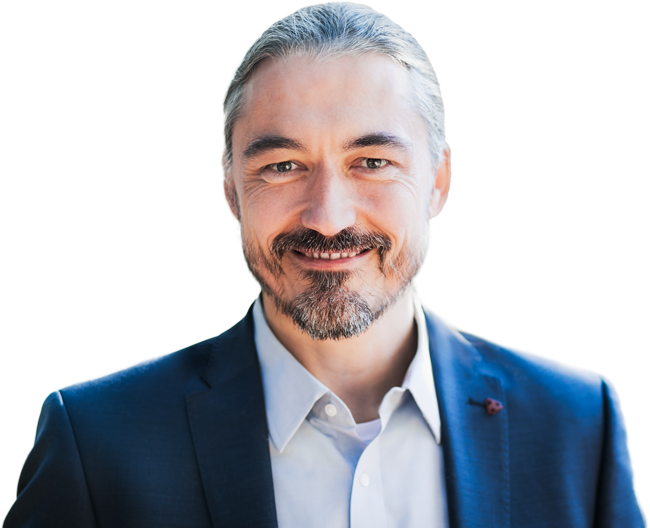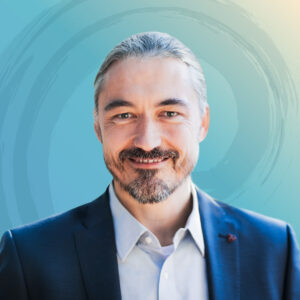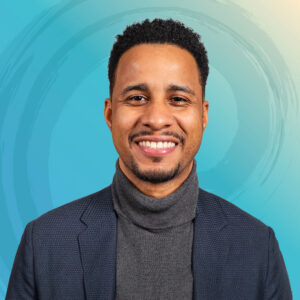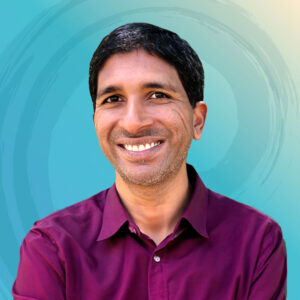In this episode, Thomas Hübl discusses how we can work together as a society to address, digest, and integrate disruptions to the democratic process to bring about positive change and systemic coherence.

EPISODE 04
February 28, 2023
The Detox Phase of Democracies

Share this:
Listen Now
“We need a disturbance to create a higher level of collective coherence.”
- Thomas Hübl
Guest Information

Thomas Hübl
Thomas Hübl is a renowned teacher, author, and international facilitator whose work integrates the core insights of the great wisdom traditions and mysticism with the discoveries of science. Since the early 2000s, he has been facilitating large-scale events and courses that focus on meditation and mindfulness-based awareness practices, as well as the healing and integration of trauma.
His non-profit organization, The Pocket Project, works to support the healing of collective trauma throughout the world. He is the author of the book Healing Collective Trauma: A Process for Integrating Our Intergenerational and Cultural Wounds.
His next book Attuned: Practicing Interdependence to Heal Our Trauma—and Our World will be published September 12, 2023 by Sounds True and is available for preorder on Amazon, Barnes & Noble, IndieBound, Bookshop, and more!
For more information, visit thomashuebl.com
Notes & Resources
In this episode, Thomas discusses:
- How the forces of being, becoming, and belonging apply to democracies
- The need for stressors to surface as disturbances so that they can be addressed, detoxed, and integrated into society
- How democracies would benefit from ‘digestion spaces’ where people gather to process trauma
- Systemic resourcing and how we build societal coherence
Learn more about Thomas and his work at thomashuebl.com.
Episode Transcript
Thomas Hübl: Hello and welcome again to my podcast. Today I would love to explore with you a little bit the state of our democracies. Why do I want to do that? Because I just came from a workshop that I led in Germany over the last days where we deeply explored the connection between the democratic process, democracies, and collective trauma. Why is knowing about collective trauma, deeper trauma-informed understanding, important for us to build resilient, sustainable, coherent democracies? And, I mean, it’s a very complex topic, of course, but I want to share with you today a few of the highlights of the thoughts and processes that came up also through the workshop, but of course before. And one of them is that I, through my work in the last 20 years, I became aware of how collective trauma affects human systems. It affects, of course, individuals, but also affects organizations, societies, and our global humanity.
And we all know that democracies, evolutionary-wise, are still young and we transitioned out of a long phase of power over in domination hierarchies. Where hierarchy means that there is somebody that is strong or has more power, that limits, in a way, our movement and freedom and decides, at least on some vital, existentially important things, for us sometimes. One of them is free speech. One of the, free expression. Or a deeper development of human rights. But what has been human rights? In my work, I relate to human rights as the right to be, to be in life with a place in life which is sacred. The right to become, to develop one’s inherent creativity and intelligence, and to be able to relate that intelligence to our environment. The right to belong, creating a healthy, meaningful relational network.
And so these three forces, or powers, being, becoming, and belonging are part of every one of us. And we want to support this also in everyone else. So we respect human rights in each other by respecting these three powers. But power over in domination-based hierarchies don’t do that. And so we are still very wounded and sometimes, very violently so, violate human rights and it’s still going on today.
On the other hand, democracies created a space where we made a whole leap into another form of human systems and societies. But as I said, we are still in kind of a younger form of democracies. And it’s the point of our conversation today is, what happens when we create a safer space for everybody to speak? A safer space to be present? A safer space to feel that I feel self-empowered? I have agency, I can bring my qualities into the democratic process and contribute to the society and also get the benefits of the society. And when we create that safer space, then something’s happening in our nervous systems and bodies. Because whenever there’s more safety, our inner world actually says, “Wow, that’s really great. So because now it’s safe, I can stop holding some of my wounds. I can let go partly and let that surface.” So whenever we reach a certain level of coherence or relational safety or environment that is safe enough, our inner world starts to detox itself.
But when stuff comes up, and we see periodically that in our societies there’s a detox process going on, and then there are new stressors on top of that, like the pandemic situation in the world, or wars, new stressors that create a lot of stress that might actually lead to another contraction. But when it’s possible, life wants to detox, self-heal itself. And that’s why I think that democracies again and again go through processes of incoherence where it looks like more chaotic, it looks like disturbed, it looks like more dysfunctional. It looks like it’s very messy because stuff comes up and it seems like to be like a disturbance, but that disturbance is needed in order to create the higher level of coherence. We need to see that, for example, there is violence against women. There’s a gender inequality. And in order to balance this, stuff needs to come up.
We need to bring stuff to the surface in order to create some kind of disruption that allows a new coherence that is more stable and more fair or more equal than what we had before. The same is true for racism, antisemitism, for many things. It needs to come to the surface for many millions of people to learn and grow and to come to a higher level of coherence. That is a better place for all of us to live together. So democratic resilience grows through waves of detoxification. But when we are in that phase of detoxification, it looks like things are not working at all or they’re very hard. And for our leadership, but also for every one of us, that we can see in our personal development, but also organizational and cultural development, we do need those phases in order to take care of the unlearned lessons.
The lessons not learned yet. The trauma information that is stored in the system needs to first come into our awareness in order that we are able to digest it. So we need spaces, we need to create spaces, digestion spaces, for the democratic process, the unprocessed information. And digestion leads to integration. Where do all the nutrients of our food go? They’re being integrated into our bodies. Where do the challenging situations go and everything that we experience? When we integrate those experiences, that becomes learning. We learn something, our perspective grows. That’s why I often say wisdom is inherently related to how much world I can include in the way I live.
So how much world appears in me in a sense of inner space in my inner world that can be included in the way I take decisions, in the way I act, in the way I speak, in the way I move in the world? And if the world can be hosted in billions of people inside to a higher degree, we have a higher society. The more of the world needs to be excluded and othered, the lower is the societal coherence. So we live in a society with less abilities, less collective intelligence, more friction, more fragmentation, more polarization, more othering. All of those are basically trauma symptoms. Because trauma impairs or hurts our capacity to relate and relating integrates trauma into higher functionality.
And so my point of today is that I believe once we understand that as democracies we are going through waves of detoxification, and that we need to integrate what shows up, not try to get rid of it. But to really look at it, learn, and integrate, or integrate and learn, so that we can lift our societal discourse and reality onto a new level of development. So development doesn’t only happen top-down, from innovation and the future becoming manifests, updates, upgrades, but evolution also happened through the unlearned lessons that are still frozen in the permafrost of our cultures. And they need to be melted. They need to be looked at, digested, and integrated so that we harvest the ethical learning that is still missing to deal with the technological advancement, scientific advancement of today.
We see within a domination or a power over leadership, it seems like there’s not a space that we can feel safe to detox. So what do we do? We accumulate. So if I don’t have a right to say what I feel, I accumulate. So stuff gets accumulated in millions of people’s nervous systems. It can’t go anywhere. And so we keep on holding. But if suddenly we switch into democratic system, there’s free speech, there’s human rights are being respected, there are equal rights even if our democracy is also not yet there, but we are on the way there, let’s say. And the maturity level grows because democracy also needs mature citizens. Wherever I have developmental parts that are regressive, this is where I give power away. That’s where I don’t give my contribution fully to society. That’s why I don’t feel empowered. That’s why I project a lot on the leadership. And that’s where I often think in black and white. Either it’s this or that.
It’s not that life has complexity, I can hold paradox, and I can hold contradictions in my own inner a world without immediately rejecting those. I can see that multiple things can be true at the same time, but not absolutely true. And so I have a much wider world space in myself when I look through a mature lens. And some of us at some times in our lives look through a mature lens, but maybe not all the time. So we have regressive moments, we have traumatized developmental parts in ourselves, and these are the parts that create also societal dynamics, and also much wider cultural wounds that haven’t been integrated. They create a lot of societal dynamics because there are a lot of fractures, there’s a lot of polarization, there’s a lot of othering happening where we carry undigested wounding, more massive wounding, in our societies. And so the word is coherence.
But what’s coherence? Coherence is being created through relational skill building. If I can stay related to you while we have a relationship argument, while we are seemingly looking at things very differently, but we can keep a relational space open, then our perspectives can find a negotiation process within relation. But if we shut down and if we other each other and the gap’s getting bigger, it’s harder to negotiate the content. And it’s, I think, the reverse of coherence. It’s the downgrading of coherence. So the more separation we see, the more disintegration of relational spaces, the lower is the coherence. The more we raise the coherence, the relational intelligence and the collective data streaming is growing. And the more collective data streaming, we have a base to hold the incoherence in coherence. So the incoherence is being held in the systemic coherence that doesn’t fragment when fragmentation shows up. That’s the alchemy of human development. So that the systemic coherence, the resourcing of the system, has the power to host the incoherence or the fragmentation.
And if the systemic resourcing is too weak, then we end up in repetitive cycles of retraumatization or repetition of certain behaviors or certain situations. If the systemic coherence grows, we changed it because we see suddenly, even if it’s slow, but we see a development. And it’s like a river and a boat. If the water is too low, the boat gets stuck on the ground. But if there’s enough water in the river, the boat keeps floating even if it’s slow. And so the resource is the water. It’s the movement of life. If the stagnation is too heavy, then it gets grounded and doesn’t move anymore. That’s real stuck. But if it’s still flowing, then we are taking the difficulty with us and we are evolving or transforming the difficulties slowly into something new. And that’s what, I think, is an important factor for the evolution of societies and of bigger topics that we have to solve. Systemic resourcing and how we build coherence.
And so how we build coherence is first that the level of coherence every one of us carries inside, it’s the level of authenticity, self contact, awareness, inner presence, relational capacities, to be able to bring my worldview into the room, to be able to listen to your worldview, even if it contradicts mine. And to find a common space where we can still hold a relational space that hosts both of us. Why do we go to therapists when we get stuck? Because we can make use of the resourcing of somebody else, increase the systemic resources, the therapist and I, and that helps me to have more water. So that helps me to move my load and develop it further. Why do we need to come together in groups to deal with collective issues? Because we bring more resourcing together and then it helps us to look at collective issues with a collective intelligence. So collective intelligence is a tremendous healing power.
And so when we look at the democratic process, I believe one of the collective trauma symptoms is that we don’t have enough built-in, funded by the state, digestion spaces. For example, what happened through the pandemic so far in the last two years needs to be digested. And of course many people are trying to digest the process through private or friendship interactions to digest it. But I think we also need much bigger collective spaces where we can digest the hardship, and the difficulties, and sometimes the loss, and the existential threat, and people lost their jobs, and the economy got much worse and that produces a lot of follow-up effects for many people.
We need a space to digest it. That we see, “Oh, we are not alone.” We are actually embedded in a more generous environment. We are not single fighters, solo fighters, we are actually communities of people supporting each other. But the harder it gets, sometimes, we feel we are more alone because we stop reaching out, we don’t feel enough supported. We feel alienated or we feel kind of abandoned. And then we retract. The more we retract, the harder it gets. So relational and collective coherence building means that we keep the collective data flow alive. We care for the collective data flow. So we invest in its power because we know that that’s the water we need to move our collective load forward.
But this needs us all. It’s not that somebody will do it for us. We have to do it. Everybody that wants that needs to do it. And then it’s like when I want to live in a trauma-informed world, it’s great, so I need to become trauma-informed and I start automatically living in a trauma-informed world because I create that around me. But I’m not waiting for somebody else to do it because then it’s not going to happen. Because if everybody waits for somebody else to do it, we won’t have it. And so do that we contribute to the collective coherence that we want, or we also join spaces that already exist where we can harvest the collective intelligence and where we can also detox some of the wounds. And we know that process is a very healthy process, even though often it’s not a comfortable process. But we all know when we go through such a phase and we come out on the other end of the valley, there is again sunshine and we get stronger, we get wiser. And I think that’s worth doing it.
So one of the spaces, for example within our NGO, The Pocket Project, which deals with collective trauma around the world, we have regular calls where people can taste or be part of such a collective digestion space, for example. We have global social witnessing calls where we witness more collective events, how they impact us. And how we can digest that kind of impact, for example, a war or a specific situation in the world, has on us, and how the societal body digests that. But also smaller groups that we create at home with friends, where we set the intention, “Okay, let’s just listen to each other.” Not to give advice, not to give good therapeutic advice to each other, but we just want somebody to listen.
But to listen with attention, to listen with attunement, and to just with an open heart we listen to each other how we experience the pandemic, how we went through the pandemic, “What’s my evolution through the pandemic?” Not only the virus evolved and mutated, we also evolved. So who was I before and who am I now? And these are very important reflections because we see, wow, even if it was hard, many things developed, our environment developed. What did we learn as humanity? And also what was hard and when I share about it, I start discovering that actually I’m holding still some of that stress or some of that fear that came up through uncertainty.
And then I see through sharing and being listened to, I can also digest and we can digest together and learn even more. So we also offer these kind of digestion spaces. And there are also other groups and organizations in the world that come together and offer such kind of space. I hope that’s an inspiration to look at democracy also a little bit through a collective trauma-informed lens, and as part of my podcast, the Point of Relation. So today we created a relation to the detox mechanism of our democracies. And thank you for joining, and I see you soon.





